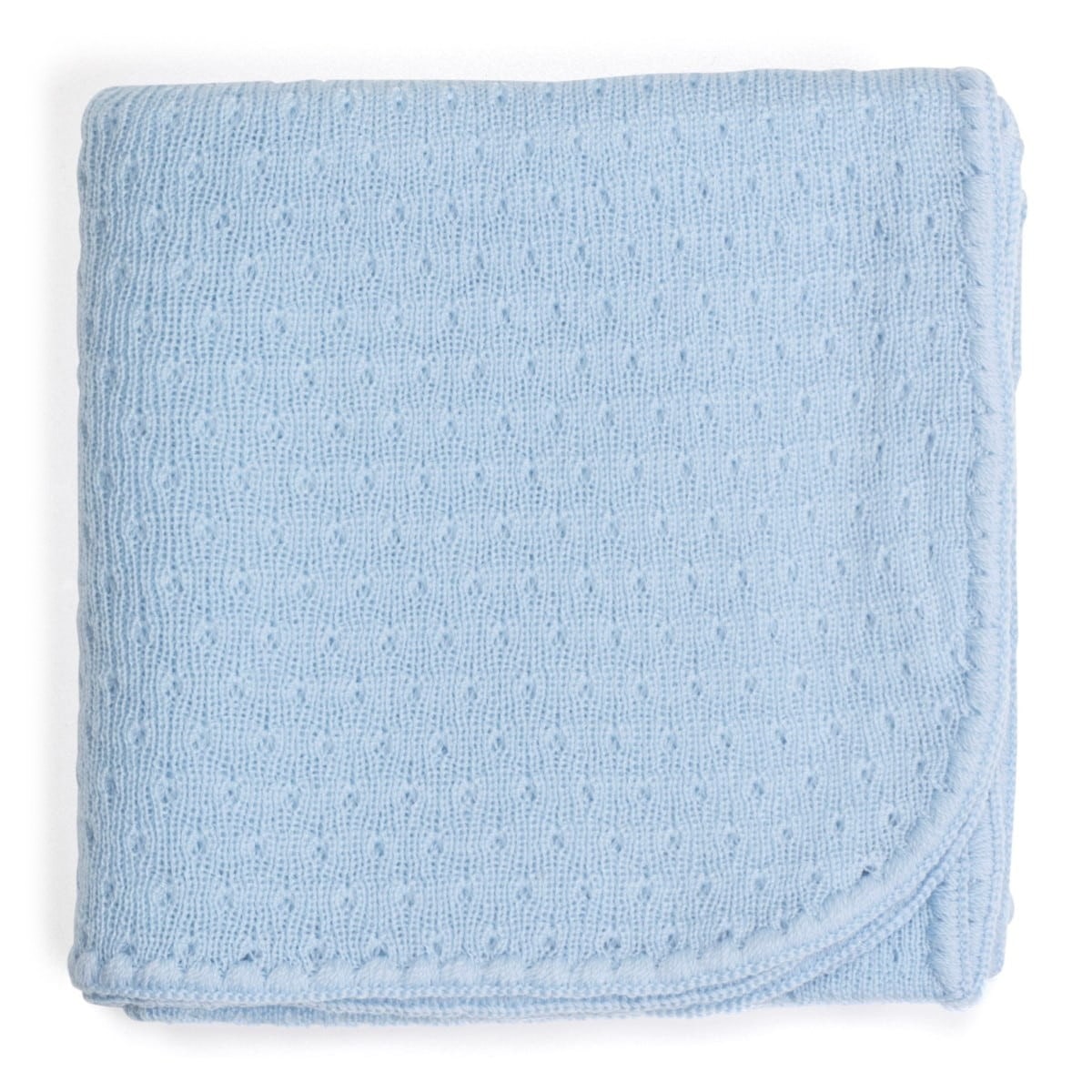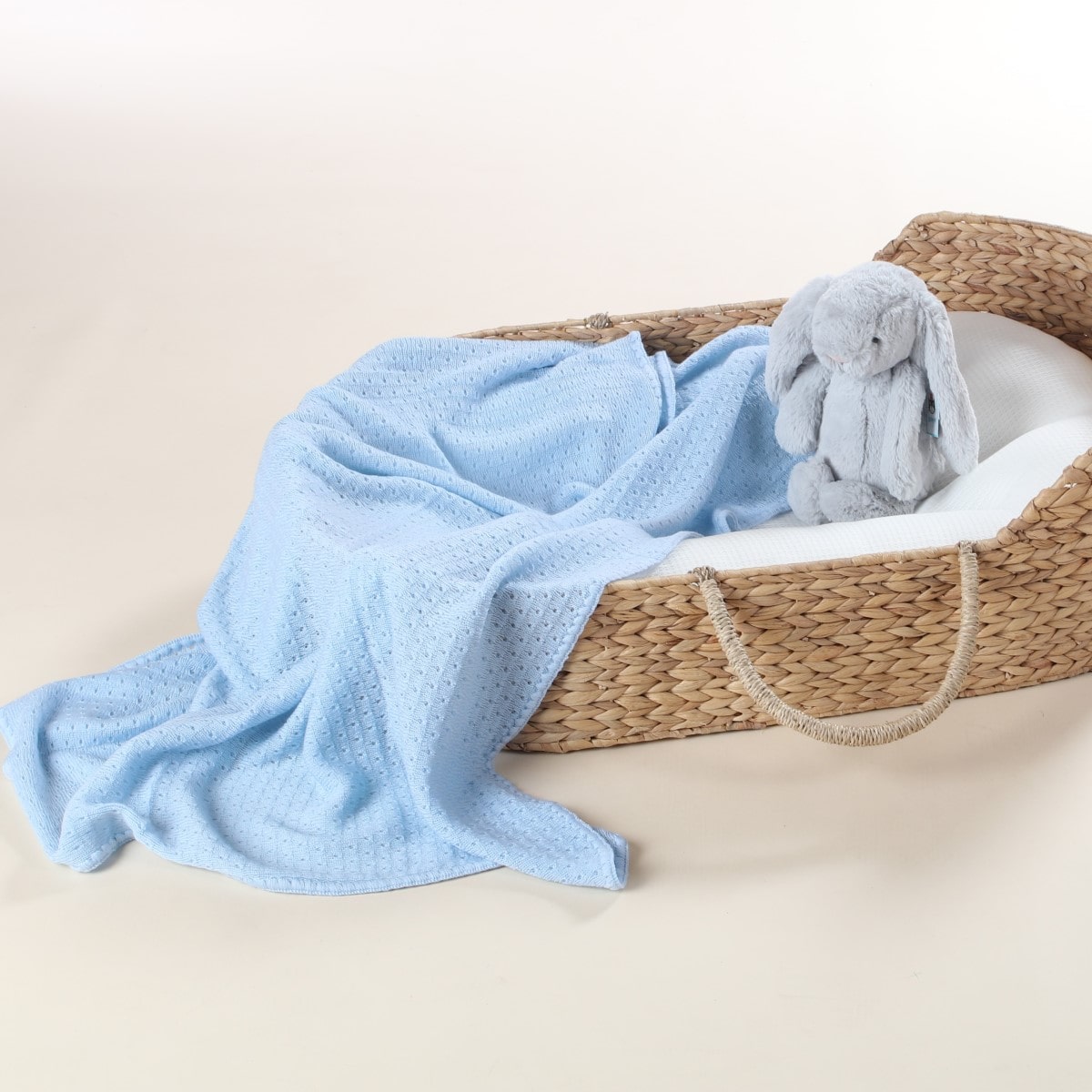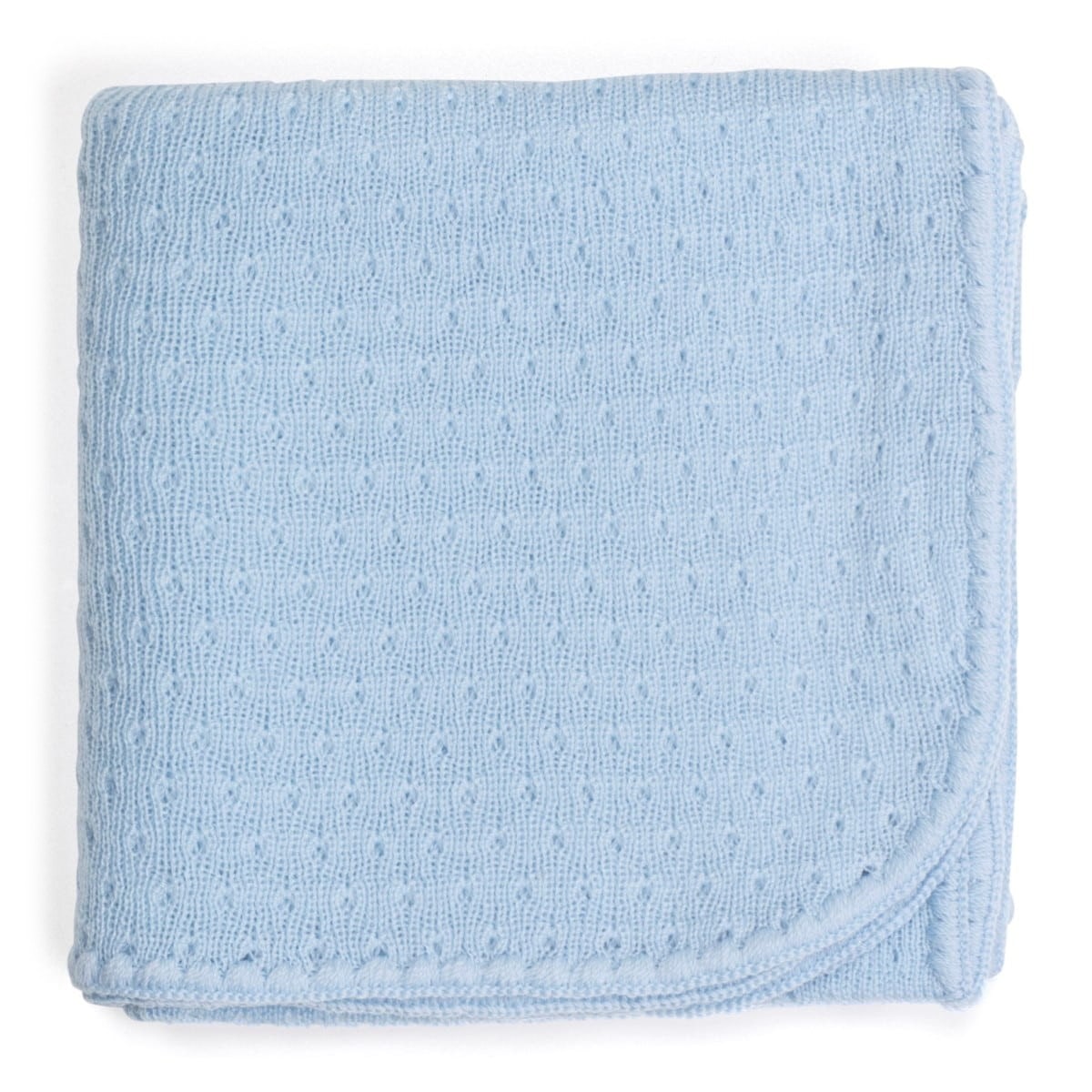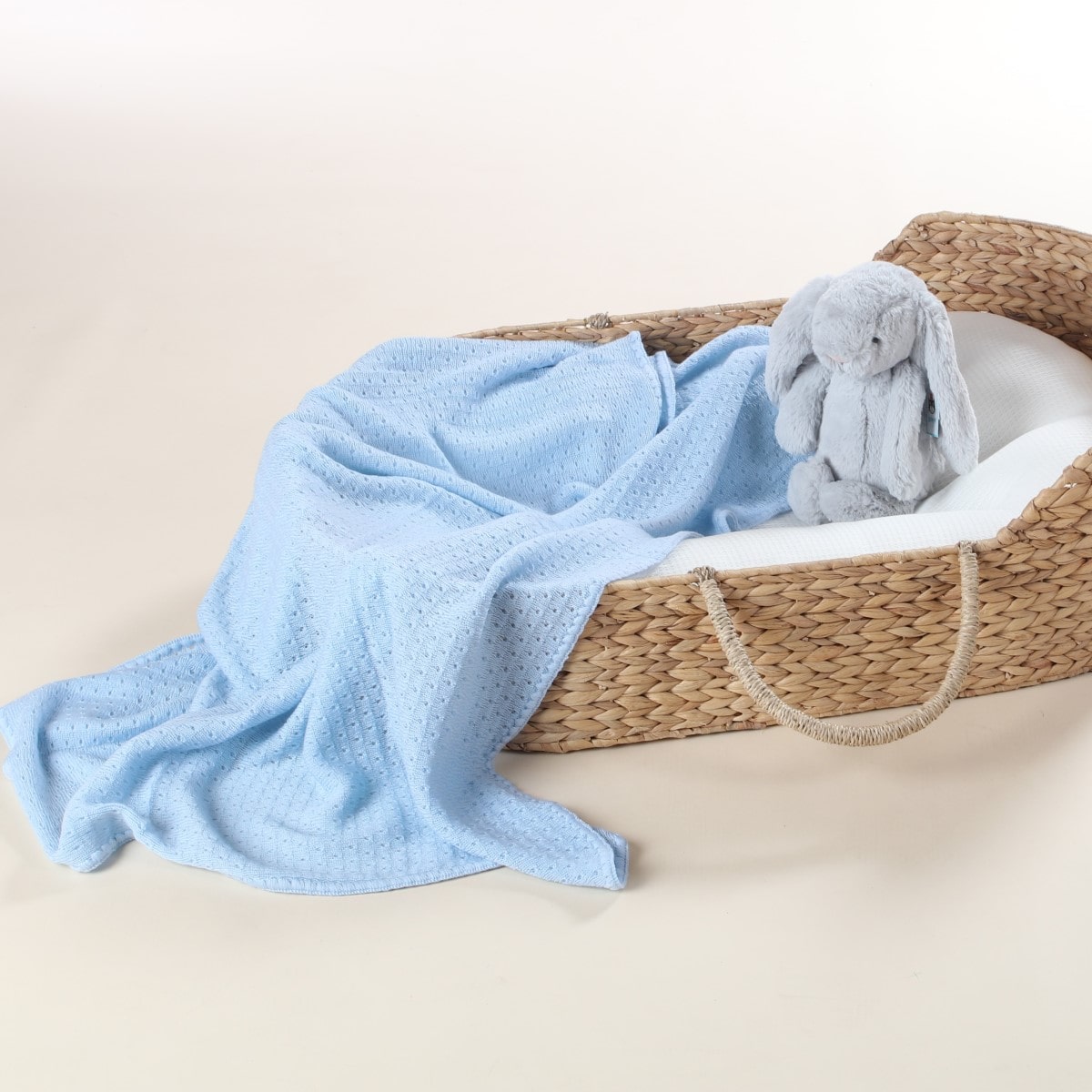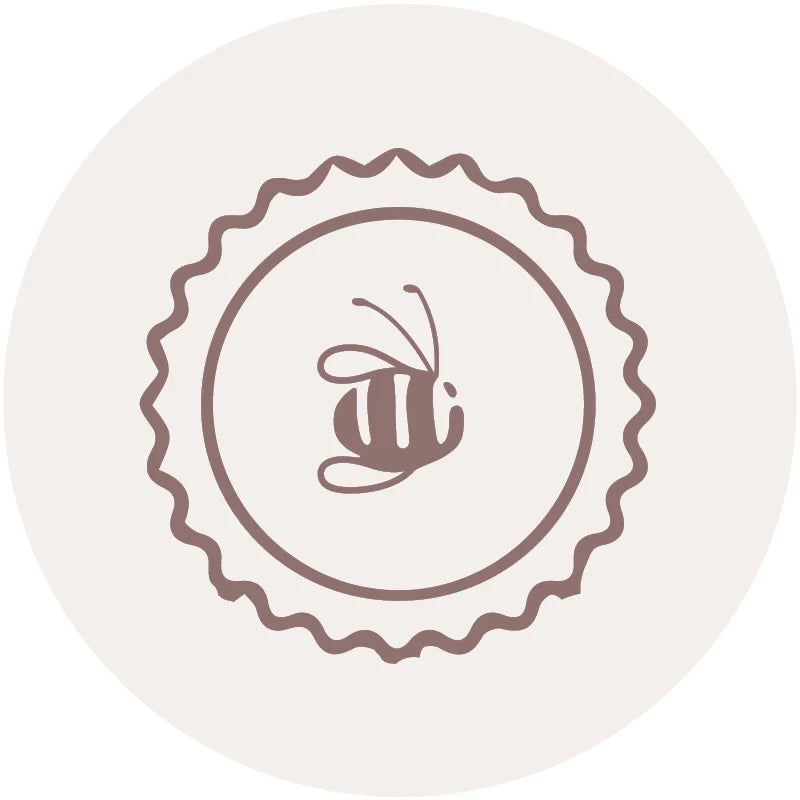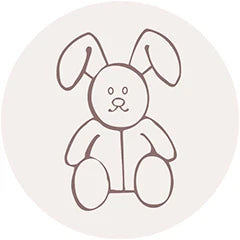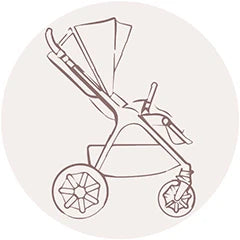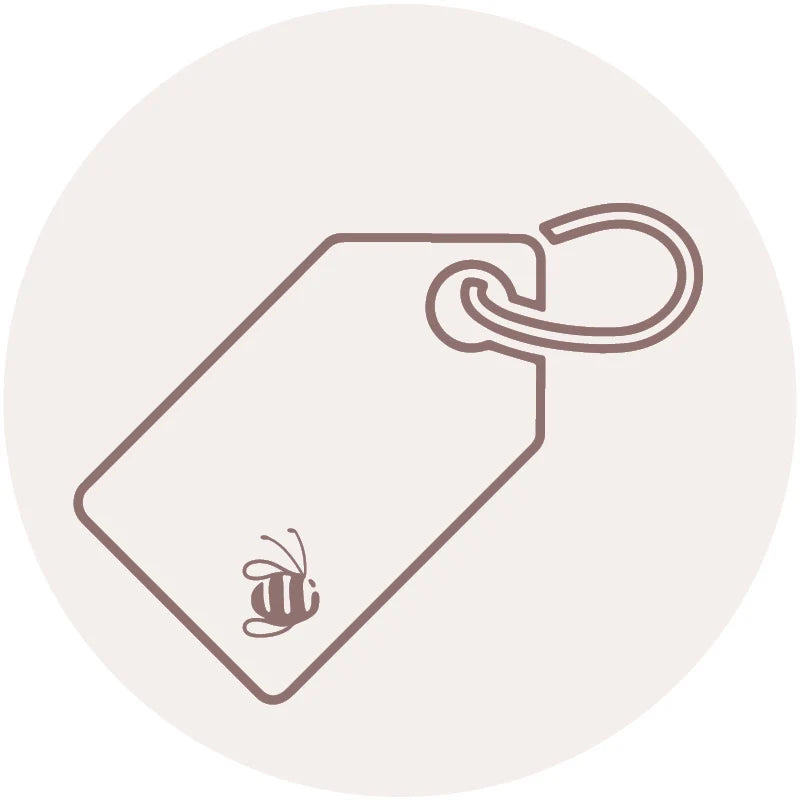Merino Eyelet Blanket
Merino Eyelet Blanket
SKU:AA0010.001B
Clothing Prem to 18 Months
| Size | Age Guide | Weight | Height |
|---|---|---|---|
| Premature | Premature or Small Newborn | Up to 4Kg | Up to 55cm |
| Newborn | 0-3 months | 4-6Kg | Up to 62cm |
| 3 Month | 3-6 months | 6-8Kg | Up to 68cm |
| 6 Month | 6-12 Month | 8-10Kg | Up to 76cm |
| 12 Month | 12-18 Month | 10-12Kg | Up to 84cm |
| 18 Month | 18-24 Month | 12-14Kg | Up to 92cm |
Clothing 2 to 6 Years
| Size | Age Guide | Height | Chest | Waist | Hip |
|---|---|---|---|---|---|
| 2 Year | 2-3 Years | Up to 100 cm | 56 | 51 | 58 |
| 3 Year | 3-4 Years | Up to 105 cm | 58 | 53 | 60 |
| 4 Year | 4-5 Years | Up to 110 cm | 60 | 55 | 62 |
| 5 Year | 5-6 Years | Up to 115 cm | 62 | 57 | 64 |
| 6 Year | 6-7 Years | Up to 120 cm | 64 | 59 | 66 |
Beanie Size Guide
| Size | Head Circumference | Age Guide |
|---|---|---|
| Premature | 31-35 cm | Premature or Small Newborn |
| Newborn | 35-40 cm | Newborn |
| Small | 40-43 cm | 3-6 Months |
| Medium | 43-47 cm | 6-18 Months |
| Large | 47-52 cm | 18-3 Years |
Sunhat Size Guide
| Size | Head Circumference | Age Guide |
|---|---|---|
| Newborn | 37-40 cm | Newborn |
| Small | 40-43 cm | 3-6 Months |
| Medium | 43-46 cm | 6-12 Months |
| Large | 46-49 cm | 12-24 Months |
| Xtra Large | 49-54 cm | 2-4 Years |
Sleep Pods Size Guide
| Size | Weight | Age Guide | Measurement(Back to Hem) |
|---|---|---|---|
| Newborn | 0-6 kgs | 0-3 Months | 60.5 cm |
| Small | 0-8 kgs | 3-6 Months | 66 cm |
Booties Size Guide
| Size | Age Guide |
|---|---|
| Newborn | 0-3 Months |
| Small | 3-6 Months |
| Medium | 6-12 Months |
| Large | 12-18 Months |
Pretty Brave Baby
| Foot Length (mm) | Insole Length (mm) | EU | UK | Age | INT |
|---|---|---|---|---|---|
| 95-104 | 110 | 16/17 | 2 | 0-6m | S |
| 104-114 | 118 | 18 | 3 | 6-12m | M |
| 114-123 | 127 | 19/20 | 4.5 | 12-18m | L |
| 123-137 | 142 | 21/22 | 5.5 | 16-22m | XL |
Pretty Brave 1st Walker
| Foot Length (mm) | Insole Length (mm) | EU | UK | Age |
|---|---|---|---|---|
| 114-120 | 125-128 | 19 | 3 | 1 yr |
| 120-126 | 132-135 | 20 | 3.5 | 1-2 yrs |
| 126-132 | 138.5-141.5 | 21 | 4.5 | 1-2 yrs |
| 132-138 | 145-148.5 | 22 | 5 | 2 yrs |
Crywolf Swim Nappy
| Size | Length (waist to crotch) | Crotch Width (side to side) |
|---|---|---|
| 0-1 yr | 1-2 yrs | |
| 37 | 38 | |
| 14.5 | 15.5 |
Crywolf Rash Suit
| Size | Length (back neck to crotch) | Chest (arm to arm) | Waist (side to side) | Sleeve (neck to cuff) | Neck Opening(diameter) |
|---|---|---|---|---|---|
| 6-12 Months | 1 yr | 2 yrs | 3 yrs | ||
| 40 | 42 | 44 | 46 | ||
| 25 | 26 | 27 | 28 | ||
| 24 | 25 | 26 | 27 | ||
| 30 | 31.5 | 33 | 34.5 | ||
| 13.25 | 13.25 | 13.8 | 14.3 |
In stock
Couldn't load pickup availability
Overview
Overview
Your baby will love the ultra softness of this lightweight 100% fine merino blanket. The classic textured eyelet stitch makes the blanket breathable while retaining warmth and comfort, featuring a traditional blanket stitch edging. This all-purpose blanket is perfect for use in a cot, a stroller or can be used as a wrap.
Product dimension in cm: H90 xL90
Made in New Zealand
Fit & Care
Fit & Care
Delivery and Returns
Delivery and Returns
- Delivery: Free within NZ on orders over $100 (excluding bulky items) or $8 standard shipping
- Returns: Accepted within 14 days of receipt with proof of purchase
- Some items are excluded from returns including sale items, hardware, car seats, prams, monitors and personal items - please click here for the full list.
Share this product
Recently viewed products
Related Blogs
A Guide to Baby's Temperature
As a parent there always seems to be something to worry about! A common concern in these cooler months is baby’s temperature and how to hit the ‘Goldilocks’ sweet spot – not too cold; not too hot! Monitoring baby Babies can’t regulate their own body temperature for the first six weeks, so it’s important to keep an eye on them and adjust their clothing and room temperature to suit. First up – what is normal? Baby’s temperature should be around 37 degrees Celsius. A mild fever is a temperature higher than 38ºC and a high fever is anything over 39ºC. A thermometer is a great addition to your home first aid kit – giving you a quick and accurate temperature reading. These will typically get used a lot throughout childhood, making them a great investment. Some great options include digital forehead thermometers for quick and contactless checks such as Oricom's Non Contact Infrared Thermometer or Nuk's Baby Flash Thermometer. It’s a good idea to also take your baby’s temperature on a day when they’re content and well, so you can check their ‘normal’. Babies under three months with a mild fever and babies between three and six months with a high fever (over 39ºC) should be taken to the doctor. Another way to gauge baby’s temperature is to gently touch the back of their head or tummy – it should feel warm. (While they offer easier access, don’t go by their hands or feet, as these extremities are often cooler.) Ideal temperature for a sleep space It’s important to make sure the room where your baby is sleeping is at a comfortable temperature - around 18-20ºC. If you have a heater, heat pump, or air conditioning with a thermostat, you can set it to 18ºC and it will flick on and off as the temperature changes throughout the night. Clothing and bedding choices are key Merino is a natural wonder that’s perfect year-round – helping with temperature regulation. It has little pockets of air that keep warmth in on cold days, and cool baby down on a hot day. Another great natural fibre for baby is organic cotton . It can eliminate moisture build up between clothes and your baby’s skin, to keep your them comfortable and dry. Clothes for when you’re out and about For daytime, opt for layers so you can add or remove a layer to keep baby comfortable - again sticking with cotton and merino. If your baby falls asleep in the pram or car - yay! But both spaces can heat up and get airless quickly – so don’t forget to monitor their temperature. Think about ways to provide shade and airflow – and don’t leave them asleep in a car alone. Bath time Ideal water temperature for a bath is 37°C. It should feel warm and soothing, but not too hot for delicate skin. You can test the water with the inside of your wrist, or make it super easy with a Oricom Duck Bath Thermometer or the colour-changing Pebbly.
Learn moreThe Secrets of Dimples Merino, Natures Miracle
Marvellous Merino – and How to Care for It Dimples high-quality Merino is made in New Zealand and designed to last – treat it with love and care and it will stay looking beautiful for years to come. Why Merino? Merino wool truly is nature’s miracle. Its warm, soft, breathable fibres keep your little one comfortable all year round. Because babies take time to develop the ability to regulate their temperature – and can’t tell us if they’re too hot or cold – Merino clothing and sleepwear offer peace of mind. The natural fibres form little pockets of insulating air, keeping warmth in on chilly days and helping release heat when it’s warm. Other wonderful benefits of Merino: Naturally hypoallergenic – gentle on delicate skin and suitable for babies with eczema, allergies, or sensitivities Naturally flame-resistant – without added chemicals Moisture-wicking – absorbs moisture while staying warm and drying quickly Stain-resistant – perfect for little spills and dribbles Keeps its shape – it stretches with your baby, then springs right back after each wash Made to Last Each Dimples Merino garment is lovingly hand-sewn and embroidered by our talented team right here in New Zealand. Crafted with care and attention to detail, these pieces are designed to last – ready to be worn, washed, and passed down through generations. To help your Merino stay soft, beautiful, and in great condition, it just needs a little extra love when it comes to care. How to Wash Merino Always check the garment’s care label first Do not soak – for stubborn stains, we recommend Sard Wonder Soap. Wet the stain in cold water, rub on the soap, agitate gently, then rinse thoroughly Use a wool-approved detergent like Earthwise Wool & Delicates. Dilute the detergent before adding to your washing machine – never pour directly onto the fabric Avoid detergents that contain eco-brighteners or enzymes, which can damage Merino fibres (even some ‘baby’ or ‘eco’ detergents) Use the wool wash cycle on your machine, or hand wash gently in cold water Rinse well, gently squeeze (no twisting), and lay flat to dry in the shade Never bleach, rub, soak or tumble dry. Merino prefers to be air-dried Cool steam iron if needed – and yes, it’s dry cleanable if preferred How to Dry Merino Merino should be air-dried flat in the shade. Direct sunlight can cause fading or damage, and tumble dryers are a no-go. How to Store Merino Because Dimples Merino contains no chemicals, it can be extra appealing to clothes moths. If you're packing your garments away for a while: Wash and dry them first Store in a sealed garment bag or container Clothes Moths – What to Watch For Noticed tiny holes? Pop the item into a sealed bag and freeze for 72 hours – this helps eliminate any moth larvae. After freezing, rewash the garment as usual. Shop the full range of our luxurious Merino here
Learn moreKeeping Winter Bugs Away from your Baby
Keeping your baby well and cosy this winter Winter can be a challenging time when you have a little one, especially if they’re brand new. 🐣 Alongside keeping baby warm and dry, you’re also up against colds, flu, and other winter bugs that seem to be everywhere. Because babies’ immune systems are still developing, they’re more vulnerable to infections. Their tiny nasal passages and lungs also mean illnesses like colds and flu can affect them more than adults. But don’t worry—there are plenty of ways to reduce their risk and help them recover quickly if they do catch something. Stay warm, stay comfy While “catching a chill” won’t cause a cold or flu, keeping your baby warm and dry helps their body focus on fighting off germs instead of battling the cold. Dress your baby in one extra layer than you’re wearing, and choose clothes that are easy to add or remove as they warm up or cool down. Keep your home temperature steady around 18 - 20°C for cosy comfort. Merino wool is a winter hero for babywear and bedding. Its natural temperature regulating properties keep babies warm without overheating, making it ideal for layering under pyjamas and sleepwear. Fuel their immune system Good nutrition is vital to support your baby’s developing immune system. Once they’ve started solids, offer a colourful variety of fruits and vegetables rich in vitamins and antioxidants. Frozen produce can be just as nutritious as fresh, especially during winter when fresh foods may have been stored for long periods. Avoid refined sugars and processed foods, which can impair immunity. When possible, prepare baby’s food from scratch to keep nutrient levels high. While supplements aren’t usually necessary for babies, some parents choose to use vitamin drops - just make sure these are used as a boost to a healthy diet and given in the correct amounts. Keeping germs at bay Reducing exposure to germs is one of the best ways to keep your baby healthy during winter. Handwashing is the frontline defence. Wash your hands thoroughly and frequently, especially after being in public places, changing nappies, or before feeding your baby. Teach older siblings to wash their hands immediately after coming home, and encourage good hygiene habits like coughing or sneezing into their elbows instead of their hands. If your baby is old enough to explore, regularly clean their hands as well, since babies often put toys and fingers in their mouths. When out and about, keeping your baby’s pram covered can help shield them from strangers’ coughs and sneezes or accidental touching. Regularly clean toys and surfaces baby frequently touches at home to limit germs. Avoid close contact with anyone who is unwell, and try to limit your baby’s time in crowded places during peak cold and flu season. If you’re still breastfeeding, it’s especially important to keep germs away - breastmilk passes vital antibodies that help protect your baby from many illnesses. This natural immunity boost makes hygiene and reducing exposure even more crucial. Hydration is key Breastfeeding also helps keep your baby hydrated and supported through winter. Regardless of feeding method, ensure your baby drinks enough breastmilk, formula, or water (if old enough) to prevent dry nasal passages and reduce infection risk, especially if you’re using heaters or air conditioning, which can dry the air. When sniffles strike Even with your best efforts, babies can still catch colds. If your baby starts showing signs of a runny nose or congestion, gentle relief can make a big difference. Nasal decongesters designed specifically for infants safely clear blocked noses, making it easier for them to breathe and sleep. Using a few drops of saline beforehand can help loosen mucus for easier removal. A chest rub can be especially helpful for sleep. Raising the head of their cot slightly and running a humidifier in their room can soothe irritated airways. While some parents like using eucalyptus rubs or essential oils, it’s best to apply these to bedding or sleepwear rather than directly on baby’s skin to avoid irritation. Having these supplies ready before cold season hits means you’re prepared to help your little one feel comfortable and recover quickly. Ready for a cosy, healthy winter? Our collection of beautiful merino babywear and bedding is designed to keep your baby naturally warm and comfortable all winter long. With merino’s breathable and temperature-regulating properties, you can feel confident your baby is snug without overheating. Shop the range here.
Learn more

